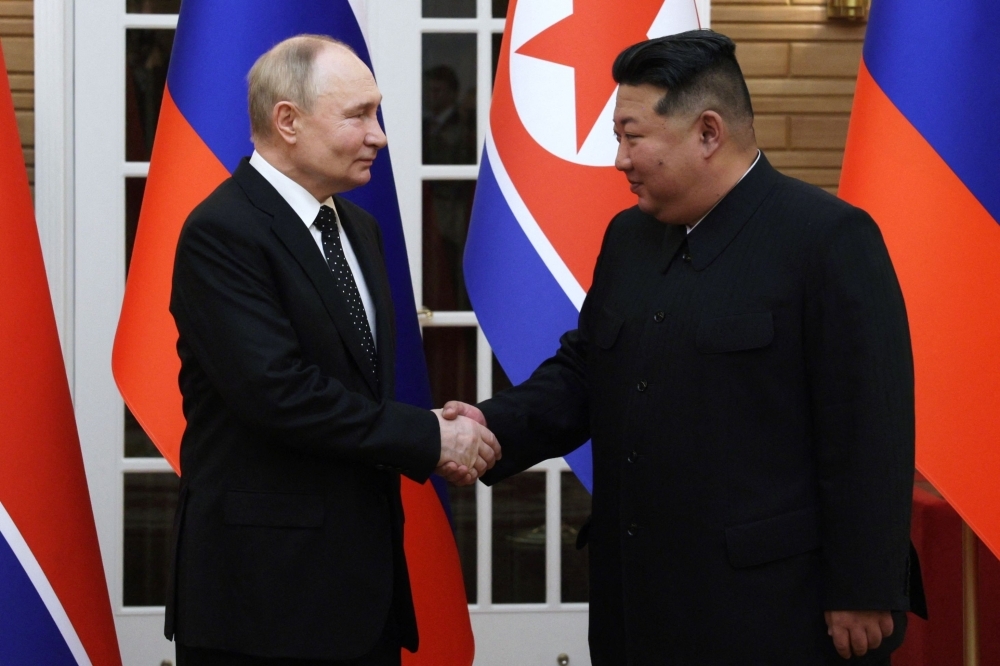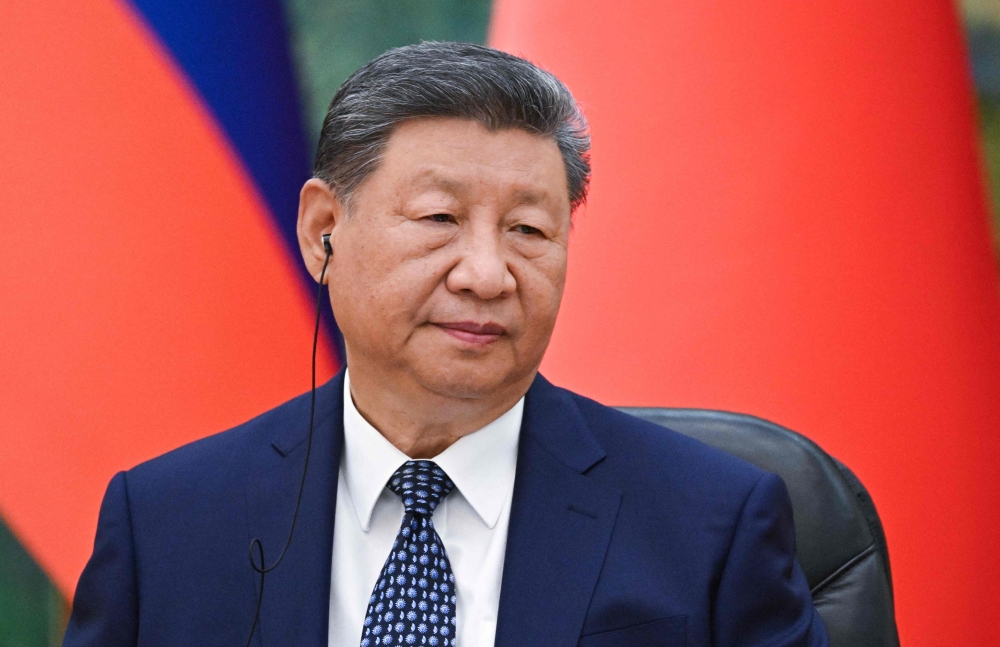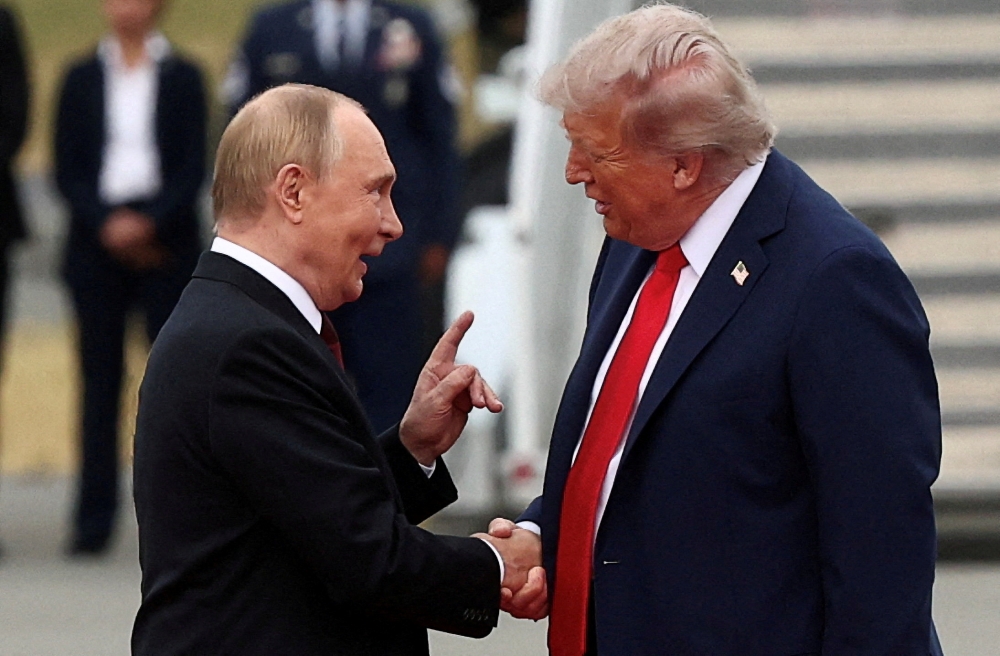
North Korea’s pivot: Why Kim’s Beijing trip changes everything for Trump

North Korea’s leader Kim Jong Un and Russian President Vladimir Putin shake hands after a welcoming ceremony at Kim Il Sung Square in Pyongyang on June 19, 2024. — AFP pic
Wednesday, 03 Sep 2025 7:00 AM MYT
SEOUL, Sept 3 — North Korean leader Kim Jong Un is in China for a high-profile visit, a rare step beyond his country’s borders for prospective meetings with President Xi Jinping and his Russian counterpart Vladimir Putin.
The trip could be Kim’s bid to “formalise” ties with Pyongyang’s two main allies – and potentially play a more prominent role on the international stage, experts say.
AFP takes a look at what we know:
What’s going on?
Beijing is hosting a massive military parade on Wednesday to mark the 80th anniversary of Japan’s surrender in World War II.
Kim and Putin are among more than 25 world leaders slated to attend, marking the first time the two men have appeared alongside Xi at the same event.
Their presence “formalises the China-Russia-North Korea trilateral (relationship) to the public”, Soo Kim, a geopolitical risk consultant and former CIA analyst, told AFP.
“What better way to send a visual message to the rest of the world, notably the US, Japan, and South Korea, that this is indeed the trilateral they are up against?” she said.
What might it mean?
Nuclear-armed North Korea and Russia are traditional allies that have grown closer since Putin launched the full-scale invasion of Ukraine in 2022, with Kim sending weapons and thousands of troops to help Moscow.
“This not only earned Kim a sweet spot with Putin – effectively, it also helped him strengthen his global positioning,” Soo Kim said.
By deepening military cooperation with Russia, the North Korean leader was able to “emerge” from global isolation following years of heavy UN-led sanctions over his banned weapons programmes, she said.
China is Pyongyang’s other major backer, and has also never denounced the Ukraine war – drawing criticism from Western nations that it is tacitly supporting Russia.
The parade is “political theatre of the highest order... the primary message is the political solidarity of this new axis”, Seong-Hyon Lee, a visiting scholar and associate at the Harvard University Asia Center, told AFP.
For Xi, the grand spectacle “cements his role as the undisputed leader of the anti-Western coalition”, Lee said, adding that it also “shatters the narrative of (Putin’s) diplomatic isolation”.

China’s President Xi Jinping attends a meeting with Russia’s President Vladimir Putin in Beijing on September 2, 2025. — AFP pic
What does it mean for Kim?
Kim enjoyed a brief bout of high-profile international diplomacy from around 2018, meeting US President Donald Trump and then South Korean President Moon Jae-in multiple times.
But he withdrew from the global scene after the collapse of a summit with Trump in Hanoi, Vietnam, in 2019.
Kim stayed in North Korea throughout the Covid-19 pandemic, but met Putin in Russia’s far east in 2023.
Although Kim’s grandfather, North Korea’s founding leader Kim Il Sung, actively pursued global diplomacy, his father and predecessor Kim Jong Il was significantly more reclusive, said Cheong Seong-chang at Seoul’s Sejong Institute.
Kim Jong Un’s trip to Beijing could signal that, “like his grandfather... he will now become more active in foreign diplomacy”, Cheong said.
Xi is also set to visit South Korea later this year for a major summit, and Kim’s trip could signal an effort to hedge against the Chinese leader improving ties with Seoul’s new president, Lee Jae Myung.
His China trip shows that Kim “feels more comfortable and confident as Russia-North Korea ties grow”, Andrew Yeo, professor of politics at the Catholic University of America in Washington, told AFP.
What about Trump?
The Chinese parade comes as Trump steps up efforts to broker peace between Russia and Ukraine.
Trump – who met Kim three times and once even said they had fallen “in love” – has voiced hope of meeting him again.
Since their failed 2019 summit, Pyongyang has declared itself an “irreversible” nuclear state and recently rejected any suggestion of improving ties with Seoul’s Lee.
Putin may even “serve as a useful go-between (for) Kim and Trump”, Vladimir Tikhonov, Korean Studies professor at the University of Oslo, told AFP.
“Putin has been indicted for war-related crimes, but he is also perhaps the only contemporary power holder whom both Trump and Kim trust,” he said.

US President Donald Trump shakes hands with Russian President Vladimir Putin as they meet to negotiate for an end to the war in Ukraine, at Joint Base Elmendorf-Richardson in Anchorage, Alaska, on August 15, 2025. — Reuters pic
What will come afterwards?
If Kim’s Beijing trip is a success, it could help him score future diplomatic wins, Lim Eul-chul, a professor at the Institute for Far Eastern Studies at South Korea’s Kyungnam University, said.
It opens up the possibility of a “reciprocal visit” by Xi to Pyongyang for a key anniversary in October, Lim told AFP.
Now that Putin and Xi are backing Kim, Trump’s “calculus changes completely”, said Harvard’s Lee.
“The security guarantees provided by this new trilateral relationship effectively make North Korea’s nuclear arsenal non-negotiable,” he said.
“Kim is no longer just a recipient of aid. He has successfully leveraged his nuisance value into strategic relevance.” — AFP
The very moment Bloodymir Rasputin was watching the Military Parade Celebrating the end of WW2 the sirens sounded all over Ukraine under Russian missile/drone attack.
ReplyDeleteAs Putin attended Beijing parade, Russia launched 500 drones and 24 missiles towards Ukraine
DeleteFrom CNN’s Kathleen Magramo and Svitlana Vlasova
Russia launched an aerial assault on Ukraine involving 502 long-range drones and 24 cruise missiles overnight into Wednesday, officials said, as Russia’s Vladimir Putin attended China’s military parade in Beijing.
Ukraine’s air defenses shot down 451 air targets, according to the Ukrainian Air Force, but three missiles and 69 drones struck targets across 14 locations.
“The main targets were civilian infrastructure, particularly energy facilities, a transportation hub, even a garage cooperative, and, as has already become routine for the Russians, residential areas,” said Ukrainian President Volodymyr Zelensky.
Air raid sirens went off in a number of cities in the west of the country, including the capital Kyiv.
“Dozens of residential buildings were damaged across different regions of our country overnight. Firefighting operations are ongoing,” said Zelensky.
“These are clearly demonstrative Russian strikes. Putin is showing his impunity.”
Ukraine’s air force said the attacks were continuing this morning local time.
“Attack is ongoing, with several more enemy UAVs in the airspace,” the air force said.
Among the projectiles launched towards Ukraine were 16 Kalibr cruise missiles and eight Kh-101 cruise missiles.
The fresh assault is a stark reminder of the conflict raging in Europe as China’s leader Xi Jinping hosted two leaders waging that war in Beijing.
Some context: While China claims neutrality on the war, the parade in Beijing delivered a striking image of Xi flanked by Russian President Vladimir Putin and North Korean leader Kim Jong Un, whose countries both have troops fighting Ukraine.
China has, however, supported Russia economically during the war and provided it with dual-use goods believed to have supported its war effort.
Putin's visit to China is in the same category of building geopolitical supports for Russia.
DeleteNo difference from all those oversea visits that Ukrainian comedian president is doing its act of crying father-mother am over the halls of its Democratic allies.
Revisionist History.
ReplyDeleteThe parties who should be credited for winning the War in the Pacific are USA, Britain, Australia, New Zealand, India, Philippines, Malaya etc.
The soldiers mostly came from these places.
Not from Russia, North Korea or CPC's China.
w/o the Chinese holding off more than half of the able fighting forces of the jap蝗军 fighting within the battlefields in China, 大东亚共荣圈(日语:大東亜共栄圏/だいとうあきょうえいけん)would be a foregone conclusion. & all of us would be speaking Japanese now!
DeleteSimilarly, w/o the red army of the USSR fighting tooth & nail with the Nazis Germany in the European fronts, all those mfering old Europe would be chanting Deutschland über alles!
So, know-nothing mfer, anymore revisionist his-story of farts?
so what r all those nasty & derogatory remarks about Kim Jong Un?
ReplyDeleteThis Kim could be the one that uplift the North Korea from its poverty stage caused by the western sanctions imposed.
RocketMan obviously does not suffer from calorie deficiency but....
ReplyDeleteNorth Korea's average calorie intake is significantly low, with a 2020 study reporting 1,509 kcal for men and 1,344 kcal for women, which is considerably below the estimated daily requirements and far less than South Korea's intake. This insufficient caloric and nutrient intake has led to North Koreans being shorter and lighter than their South Korean counterparts, indicating a widespread food security issue and a need for nutritional support.
Key figures on North Korean calorie intake:
2020 Study:
Found average daily energy intake to be approximately 1,509 kcal for men and 1,344 kcal for women.
Comparison to Requirements:
These figures are substantially lower than the estimated energy needs for an adequate diet, as outlined by the Korean Dietary Reference Intake (KDRI) and World Health Organization (WHO) guidelines.
Comparison to South Korea:
This intake is significantly lower than the average caloric intake of adults in South Korea, which was around 2,412 kcal for men and 1,789 kcal for women in the same 2020 study.
Consequences and causes:
Physical Impacts:
The lower caloric intake contributes to North Koreans being shorter and lighter than South Koreans.
Nutrient Deficiencies:
The low intake of energy is coupled with a deficit in most essential nutrients, making the diet unbalanced.
Food Insecurity:
Factors like a lack of fertilizer, natural disasters, and poor storage contribute to food shortages, resulting in calorie deficits for a large portion of the population.
Calls for Support:
These findings highlight the need for nutrition support programs to help North Korean young adults and the general population achieve adequate nutrient intake.
There r 4 phenotypes of obesity, based on body fat composition and distribution: (1) normal weight obese; (2) metabolically obese normal weight; (3) metabolically healthy obese; and (4) metabolically unhealthy obese.
DeleteKim is obviously type 4.
Caloric intake is a misinformation for bodily health. This is especially true for citizens of the developed countries. High caloric intakes have caused multitudes of health problem, putting on strains on the national coffee & life expectancy.
Mfer, is this piece of c&p, another one of ur fraud ChatGPT search?